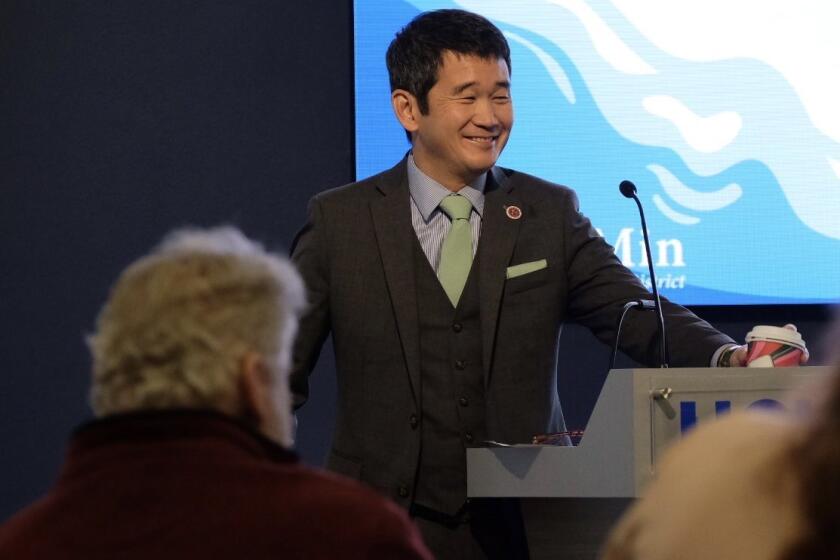Op-Ed: Sick and tired of hearing that Hillary Clinton is sick and tired

Hillary Clinton is sick and tired, declared Donald Trump at a rally this month. “She’s actually not strong enough to be president,” he added. You’d be forgiven for taking his comment metaphorically, but he and his supporters mean it quite literally. Even though Trump is two years older than Clinton, and her doctors have declared that she’s perfectly healthy, the latest anti-Clinton campaign is focused on her physical unfitness for office.
According to the conspiracy theorists, evidence of her infirmity includes the lumbar-support pillows she uses while conducting seated interviews, photos of her accepting a helping hand while climbing a set of icy stairs, a fake MRI scan and lumps under her jacket that could only be caused by a defibrillator — not a bulletproof vest.
A theme that should be restricted to ideological-fringe message boards has become a standard talking point on the right. Former New York Mayor Rudy Giuliani accused the news media of ignoring Clinton’s supposed health crisis, encouraging people to Google “Hillary Clinton illness.” The calls for Clinton to release more detailed health records are the 2016 version of that old right-wing demand that Barack Obama show his birth certificate. And they are just as loaded with prejudice.
Just as I don’t want to be held to unattainable standards, I don’t expect physical perfection from my political leaders.
The right is not alone in resorting to schoolyard taunts about the opposing candidate’s body. In five cities around the country this month, an anarchist collective called INDECLINE erected sculptures resembling a life-size, naked Donald Trump. His belly is exaggerated, and other features — those that traditionally signal masculine virility — are minimized. People clustered around the Trump sculptures, taking selfies, giggling and pointing at its sagging, pimply backside.
Mocking a candidate’s physique is a low blow regardless of gender. But the charges against Clinton are particularly pernicious, in part because they’re so familiar.
Although the conspiracy theorists claim their obsession with Clinton’s health is not rooted in sexism, women have long battled the stereotype that we are the wimpier sex. Historically, women’s physical weakness relative to men has been used as an excuse to prevent us competing for everything from corporate promotions to Olympic medals.
“All of one’s muscles, one’s very will are put to the test,” wrote a 19th century doctor on the subject of women competing in the ski jump. “This state of mind is very strenuous for more or less weak, nervous and untrained women.”
This mindset carried over into the next century, when the first woman to finish the Boston Marathon, Kathrine Switzer, was warned that her uterus would collapse if she ran too much. At the Olympics, women still aren’t allowed to compete in endurance races like the 1500-meter freestyle in swimming — they swim the 800 meters, but no longer.
“Not having some of these sporting events for women is just inertia from a time when it was believed women weren’t sturdy enough for serious training and competition,” sportswriter David Epstein told the BBC.
A similar fallacy about female fragility crops up in politics. Last year, when late-night host Jimmy Kimmel interviewed a panel of children about the possibility of a woman president, one of the boys said women weren’t up to the job. “They’re too weak,” the boy said. “They don’t have the muscles.” The line got a big audience laugh. But it proved politically prescient. This week, Clinton was back on Kimmel’s show, this time to discuss the right-wing rumors about her health. “Take my pulse while I’m talking to you — make sure I’m alive,” she joked.
Of course I have to concede that I’m concerned about Hillary’s health, too. Anyone with a schedule as demanding as hers would have to be lying — or taking some really powerful uppers — to say they weren’t tired. I know why she’s probably wearing a bulletproof vest (which the right has mistaken for a defibrillator), and it scares me. She should be able to say, honestly and without fear of confirming gender stereotypes, that running for president is exhausting and sometimes frightening. But I’m sure that she won’t.
Women of Clinton’s generation, who flooded the white-collar workforce in the ’70s and ’80s, were under intense pressure to maintain a facade of unwavering strength. That pressure has lessened somewhat for younger generations, but even today, most working women believe that we can’t let on how difficult it can be to juggle our careers and personal lives. We are determined to sit up straight without the support pillow and to ascend the icy steps on our own, lest someone catch us asking for help and assume we’re not up to the task at hand.
Just as I don’t want to be held to unattainable standards, I don’t expect physical perfection from my political leaders. And so you won’t find me giggling at a doughy Trump sculpture, let alone raising questions about Clinton’s health records. I’m sick and tired of it all.
Ann Friedman is a contributing writer to Opinion.
Follow the Opinion section on Twitter @latimesopinion or Facebook
More to Read
A cure for the common opinion
Get thought-provoking perspectives with our weekly newsletter.
You may occasionally receive promotional content from the Los Angeles Times.










